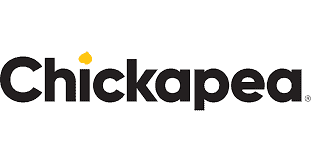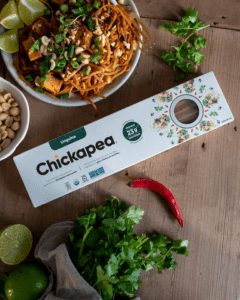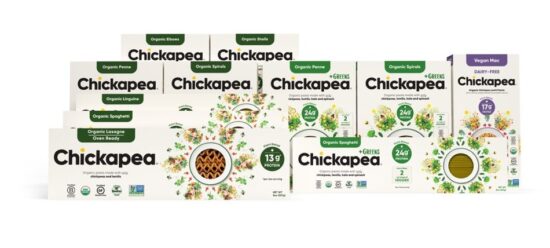Shelby Taylor is an entrepreneur, and woman in business on a mission to create good for the world through nutritious, organic meal options.
Who is Shelby Taylor and what’s #HERstory?
 As a young mother and health food store owner, Shelby recognized the challenge of putting a healthy meal on the table that everyone would enjoy, so she turned a family favorite (pasta) into a superfood. In 2016, Chickapea officially launched an organic pasta made from only chickpeas and lentils in the Canadian marketplace and then expanded into the US less than a year later.
As a young mother and health food store owner, Shelby recognized the challenge of putting a healthy meal on the table that everyone would enjoy, so she turned a family favorite (pasta) into a superfood. In 2016, Chickapea officially launched an organic pasta made from only chickpeas and lentils in the Canadian marketplace and then expanded into the US less than a year later.
Shelby Taylor is committed to using her business as a force for good and, in 2019, Chickapea was ranked in the top 10% of all Certified B Corporations on the planet—a reflection of the company’s commitment to meet the highest standards of verified social and environmental performance, public transparency, and legal accountability to balance profit and purpose.
As a certified women-owned business, Shelby is also passionate about helping other women bring their dreams to life.
MYCity4HER.com’s founder Monyka Berrocosa recently had the opportunity to interview Shelby Taylor, and talk about the exponential growth of her company and the reality of being a woman in business. Read on to learn about their conversation…Or download the interview on Buzzsprout by clicking here.
Hi Shelby, thanks for taking time to speak with me today… So what problem does Chickapea solve?
Shelby Taylor: Well, it depends where you are.
But for a lot of people, it solves an issue of allergies.
So being allergic to, whether it’s grains, or not being able to eat foods that are high in starch, for example. If you have diabetes, and you can’t eat those high starch foods that spike your blood sugar, it’s a health thing for many people. 
If you have a gluten intolerance, or celiac disease, Chickapea is gluten free. But I’d say overall, the real problem that it solves for most people is helping them to eat healthier, but still having all the foods that they enjoy.
Basically allowing people to have their pasta… and eat it too.
You’re female founded and women-led, how long have you been in business?
Shelby Taylor: We launched sales in July of 2016, here in Canada, and then in the US the following February, just about five years.
What gave you the idea to go into the business of a legumes based pasta maker?
Shelby Taylor: In 2014, I bought a small health food store. I was really into nutrition, I had started sort of studying it on the side, (my actual background is in journalism) but I got so into nutrition and I knew that I wanted to start a product. But, I wasn’t really sure what that looked like.
I was six months pregnant with my first son thinking it would just be great for market research; and then I took my time sort of figuring out what I wanted to do. After that, things moved fairly quickly because as I started to talk to my customers and listen to what they were looking for, it was pretty evident that they were struggling to feed their families healthy meals.
I started to ask them what is a food that you eat regularly, whether you don’t think it’s healthy or not?
Pasta came up all the time. This made me think… Why can’t pasta, and really ultimately the foods that we already enjoy, contribute to our health rather than take away from it?
That’s where the idea originally came from. You know, these pulses, beans, are such incredibly nutritious foods. And if a pasta could be made from them that was healthier, that would make sense…
So how did you start? How did you go from owning the store to starting this business per se? They’re completely different things retail and manufacturing?
Shelby Taylor: Yes, I have absolutely no experience in manufacturing or food, beyond this store I bought. Even so, I just started to do a lot of research. I guess that’s where a lot of my strengths lie. I have no problem asking people questions and making calls and asking every question possible. So that’s it, I just started to do a ton of research.
Then my mom and I rented a little commercial kitchen that used to be an Italian restaurant. They happened to have a restaurant size pasta extruder. So, we went to the local health store, bought a bunch of chickpea flour and started running it through this machine, basically, just to see if it was possible. And, and we could see that it was. But, there was no way we were going to get a quality product out of this small production.
With Chickapea only being made from chickpeas and lentils, and with no other ingredients at all, it’s very, very tough to make because not only is it gluten free, but it’s high protein, and then there’s no binders.
So we could see it was possible, but we weren’t going to be able to do it, not that way.
Then it was quite a long road, I think it took us probably close to 18 months overall to get from that early stage to a viable product. That included us buying some equipment, hiring a product development expert, working with a local manufacturer and all realizing this was not going to work. Eventually we moved to working with a manufacturing partner in the US. And since then, we’ve shifted and moved our production and partner with a manufacturer in Italy.
How has the pandemic affected your business?
Shelby Taylor: We’ve been really fortunate. incredibly fortunate actually. As a shelf stable pasta or shelf stable food, not only that, but a high protein shelf stable food we actually saw a good surge in sales along with a lot of the food industry. And also, we saw a lot of other pasta brands running out of stock on items.
Because we are produced in Italy, we saw firsthand how the pandemic hit Italy really hard early on before it was ever an issue here in North America. So we had a really good heads up on that. And because of that, we were able to plan ahead of time. We invested really heavily in our inventory and had inventory shipped ahead of time so that we could meet these needs proactively.
This meant we were able to fill the spots on some shelves where they were running out of pasta, which meant we had more customers trying us for the first time. But you know, getting people to taste it for the first time. Sometimes it’s a hurdle. So I would say, for the business overall, the pandemic has actually been really great for our business as we’ve become some people’s defacto pasta choice, even now that supplies of other products have resumed..
I feel bad saying that sometimes because I know how much other people and some other people’s businesses have suffered. And I’ve seen it locally here, and it’s very challenging. We’ve been incredibly fortunate.
What do you enjoy most about being in business?
Shelby Taylor: Oh, there’s so many things. But, I recently did have to think about this question for a presentation that I did. What really came to mind was the word power. I think that that word often comes with a negative connotation. But I think of it in a much different way. Owning a business has given me the power to employ people, to not only employ people but employ them in a good business that cares for them.
It’s given me the power to give funds to the charities that are important to us. And for me to live out my values, and to set an example for my children as well. It’s given me a lot of power over my own life and to make a difference in the way that I’ve always wanted to. So, I think overall that’s the thing that I enjoy the most, the power it’s given me in so many ways.
What do you enjoy the least about being a business owner?
Shelby Taylor: Sometimes the pressure is a lot. The pressure to have all of these people whose livelihoods count on you. Raising capital is very challenging, too, and knowing how necessary it (raising capital) is to keep the business going.
Also, the pressure to be the go to person. The person who really does need to stay as positive as possible, while I can still be vulnerable and honest. It’s my job to lead a team and, and sometimes, especially when you go through a pandemic, and you have children schooling at home as well, it’s very challenging. That reality and pressure can also be lots at times.
If you’re thinking back to when you decided to get this idea to start a pasta company, what, if you were back in that time? Do you know now that you wish you knew back then?
Shelby Taylor: Oh, my gosh, I knew absolutely nothing, nothing back then.
I knew nothing about starting a business.
I remember setting the company up as a corporation, and being on the phone with my lawyer thinking, ”Okay, well, what are shares and how are they set up?” I knew so little. But honestly, I don’t wish that I knew anything more, because I think being so naive back then, is what made me really believe in Chickapea and one of the reasons I was successful.
I really believed in the business and I was so excited about everything.
It was so important that I overcame challenges, I learned so much.
At first every challenge seemed like a deadly, single terrible thing that went wrong, and I thought it was the end of the business. But now I have a challenge every day, and I’m just like, “wow, it’s another thing or another hurdle to get over”. So I don’t really wish I knew anything more, I actually wonder if I’ll ever be able to start another business because now I know too much…
So what’s the best business advice you’ve been given?
Shelby Taylor: I always say the same thing for this question. Because it sticks with me, and that is “Do what you do best and farm out the rest”. I think it’s so important.
One of my major strengths is in recognizing my weaknesses and not trying to do everything. I try to hire the best that I can in every department of the business and trust in them and learn from them. I really like to surround myself with people who I feel are smarter than me, who are going to lift both me, and the business up with their expertise.
I’ve seen a lot of entrepreneurs who try to learn so much in different areas that are just really not their strengths. It just takes a lot longer to grow that way.
Very, very good advice. Too many people spend their time working in their business instead of on their business. So, you know, I think that that’s something that impedes a lot of people’s growth is knowing what you’re good at and what you’re not good at and wasting a lot of time on the stuff you’re not good at when you could be, you know, the 8020 rule that people talk about.
So you just got a big chunk of funding, 9.3 Million dollars to be exact, which I’m sure other people have talked to you about. What’s the biggest change that’s come since that’s happened?
Shelby Taylor: So it was very recent. We’ve actually been funded a few times now. Twice now by the same partners. I wouldn’t say a lot has changed since we’ve been funded just this past month of April except that , we can really put a lot of our plans into action.
We have many plans set out for this year and knowing that we are raising capital, we can now start to execute on some of those plans and such. Things like entering a new channel, looking at what our product development pipeline is, and more growth for the company. It’s an exciting time to grow.
There’s a lot of talk about female founders getting less access to capital. When you started your initial raises, did you encounter this problem?
Shelby Taylor: That’s a good question because I haven’t really felt that I have less access to capital.
Do I think it’s still more of a man’s world? Yes.
In the beginning, I had to pitch the business in front of men early on and from several Angel groups, there was probably maybe only five women all together in all of those groups. It’s intimidating and I feel like, sometimes men can be more inclined to invest in other men, or to treat women a little bit differently. But that being said, I have many male investors, and I think the access is there, it’s just sort of getting over that hurdle of, you know, being in that space with men, if that makes sense?
You’re making perfect sense. I think that a lot of women overlook the fact that sometimes their best champions can be men. There’s almost been like a backlash against men in some ways. But I know that in my business, a lot of men have helped me. And it’s actually not always the women that will step up first. So it’s an interesting perspective from you.
You do business in Canada, and in the US, can you tell me what you feel are the major differences, if any?
Shelby Taylor: There’s definitely significant differences. And, and I think you feel them differently depending on whether you are a Canadian based business or a US based business.
Because we are a Canadian company, and we have such an incredible amount of loyalty here; we’ve been able to grow really quickly here as it is our home base. We are hands down the number one pulse based pasta in Canada. And, everyone loves that story as well. When you’re from a place, and you do well. So, it’s been a little bit more accessible for us, in Canada, I would say, but at the same time, we entered the US market at a very, very good time. And now, we’re one of the most successful brands there as well.
There’s so much more ground to cover in the US. In the beginning I was, like I said, so naive, just thinking “let’s just launch it across the US. Why not?” But really understanding the differences from region to region and, and how different the customer’s shopping habits are, what their eating habits are is something that’s become key to our success.. Whereas I don’t know if there’s that vast difference in sort of culture and habits across Canada as there is from region to region in the US.
Do you feel the government’s been very helpful with your business?
Shelby Taylor: The Canadian government has been quite helpful to us. We’re always a little bit challenged because we would have a lot more funding if we were able to manufacture pasta here in Canada rather than in Italy. The equipment really doesn’t exist here in the capacity that we need it to right now. So, because we manufacture there, we don’t qualify for a lot of the government funding through agriculture.
We have qualified through many things for operating a business here and also for being a woman owned, operated business. One of my biggest investors is EDC, which is Export Development Canada, which is a government funded agency.
When you aren’t working, and you have kids, so I know you’re busy, but how do you spend your time?
Shelby Taylor: Yeah, I spend my time mostly with my family, especially this last year. We’re not doing a whole lot. We have a very simple life right now. It’s going for walks, it’s playing in the backyard. It’s lots of board games, some video games, it’s just normal stuff. I do a lot of laundry… I also try to fit in exercise as much as possible. At least three to four times a week. Just normal Mum stuff..
You know, you’ve built a significant business, which is kind of the 1% does that in the reality of the business world? What do you do when you become discouraged?
Shelby Taylor: I step away, or, just need to get out of my head most often, and gain a new perspective. Sometimes it’s as simple as a walk. Usually getting outside in nature is what I really need. So, anything that just gets me outside. Or, taking a free day, completely free of work, trying to just enjoy my family. Often I will just be able to go through things in my head and look at it a little bit differently.
Okay, that’s good advice.
You are a certified B Corp. In fact, you’re in the top 10% in the world, I think something like that of Certified B Corps. So tell us a little bit more about that.
Shelby Taylor: Sure. So for those that don’t know what B corps are, it’s a certification, and a very stringent certification process, to determine that your business is really good for the world and is doing good in the world and, and that you measure more than a bottom line.
You actually have to change your Articles of Incorporation to show that you measure not just for shareholders, but all stakeholders of your company.
There’s four pillars that they look at, which include Community and Social goodness, The Environment, how you treat your employees, and what programs you have in place for them.
Then you’re sort of ranked within these pillars. Chickapea really performs well in most categories, which is why we are in the top 10%. We also donate 2% of all revenue, not just profit, but all revenue, to charity.
We’ve just actually switched our charity partner, and we’re working with Community Food centres Canada, and a farm called The New farm, which is a leading farm in regenerative agriculture here in Canada.
And there’s a lot of science behind the idea that regenerative agriculture alone could help mitigate climate change. So it’s something that I’m personally passionate about.
We also have this core belief at the business that everyone should have access to nutritious foods, no matter their situation. So we took these two values and paired them together. So we donate 2% of all revenue to Community Food Centers Canada, so that they can buy fresh organic produce from The New Farm, which is also regenerative produce.
All of this at once, we can help address food insecurity through those that are served through the food centers, and then also participate in regenerative agriculture as well; and support that movement. So that’s a big piece of our B Corp strategy.
And then obviously, there’s a big environmental piece to that as well. Then how we operate internally and how we treat our employees. So the B-Corp process is a rigorous process to go through, but it really holds us to our values. For example when it comes to packaging for a new product, we make that decision based on our values and as a B Corp. (To learn more about B-Corp and Benefit corporations view our article previously posted by clicking here.)
Give me an example of some ways you’ve decided to green your business or be more environmentally friendly.
Shelby Taylor: As I said, we produce in Italy. And one way we try to help the environment is we source as much of our ingredients as possible, as close to our facility as possible. That way we’re not transporting those ingredients across the world and increasing our carbon footprint.
We have contracts with farmers and suppliers that are close to our manufacturing facilities in Italy. That’s one example. Packaging is another example. We’ve tried to make sure all of our packaging is recyclable, if not compostable, and we’re constantly looking at new and better options for that as well. We want to ensure that we’re not contributing to the world’s waste problem.
And then, of course, everything that we sell is organic. Sourcing organic ingredients alone, it’s so many things. You’re reducing pesticides and all kinds of terrible chemicals and protecting our water. There’s so many reasons environmentally to choose organic, and we make sure that every single thing that we produce is 100% organic on purpose with that in mind.
I have to ask you, because I asked everybody, and I have a feeling I know what you’re going to tell me but what’s your favorite food and why?
Shelby Taylor: You know, I think you’re gonna be surprised because I know I should probably say, pasta or Italian food, but my favorite food is Mexican. Big time. I just love tacos, fish tacos. It’s probably my deathbed food. I absolutely love them.
Are you ever going to make a Chickapea tortilla?
Shelby Taylor: You know, that’s a good question. But I can’t say…
About Chickapea
 Founded and led by Shelby Taylor, Chickapea is a certified B Corporation based in Ontario, Canada whose mission is to create good for the world through nutritious, organic meal options and impactful social contributions. The company, which was named in the top 100 fastest growing companies in Canada in 2020 by the Globe & Mail, offers a line of organic pasta made with only chickpeas and lentils.
Founded and led by Shelby Taylor, Chickapea is a certified B Corporation based in Ontario, Canada whose mission is to create good for the world through nutritious, organic meal options and impactful social contributions. The company, which was named in the top 100 fastest growing companies in Canada in 2020 by the Globe & Mail, offers a line of organic pasta made with only chickpeas and lentils.
Chickapea pasta is sold in more than 4,500 retail locations across North America and is available in 11 different formats including penne, spaghetti, lasagne, spirals and elbows. Recently, the company launched their +Greens line – a veggie-packed, organic and gluten-free pasta made with only chickpeas, lentils, kale, and spinach. Chickapea was founded and is led by Shelby Taylor. You can find out more about the company and use their locator to see where it is sold near you by clicking here. Chickapea is also sold on Amazon.
